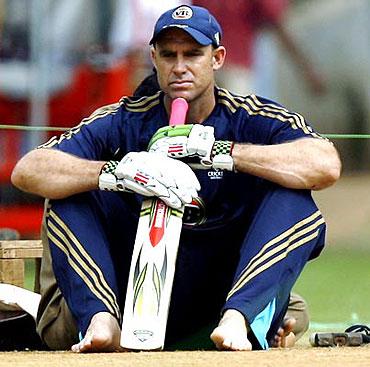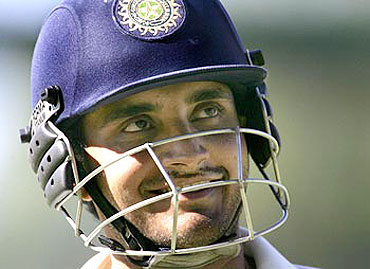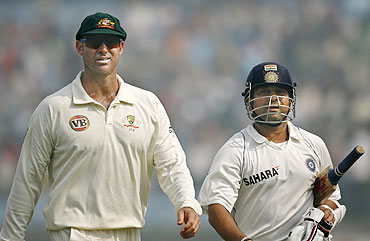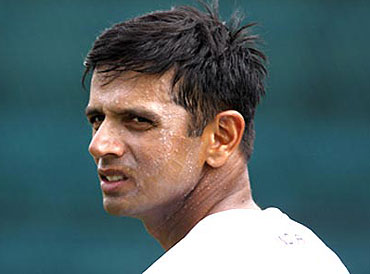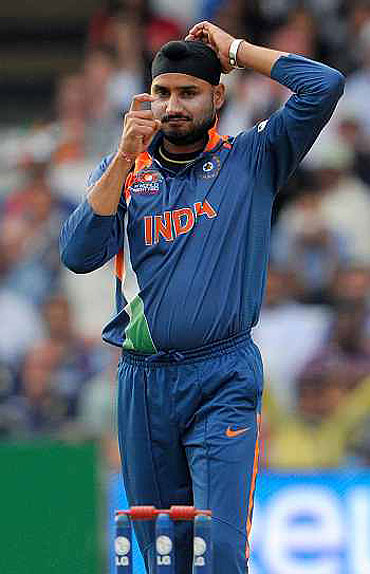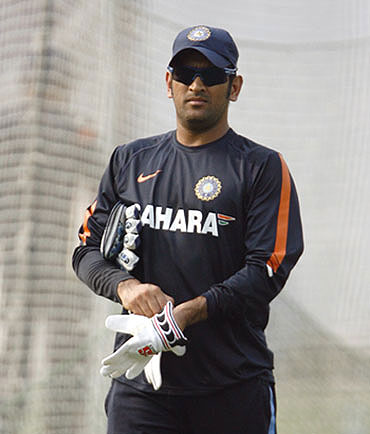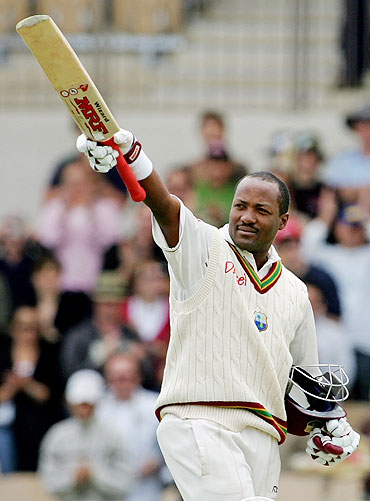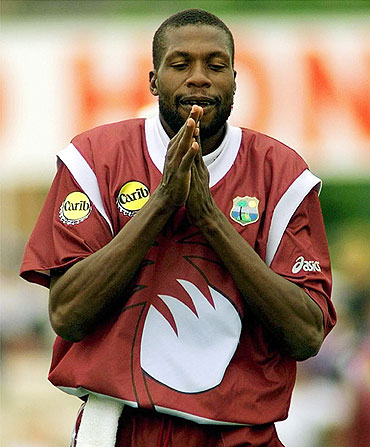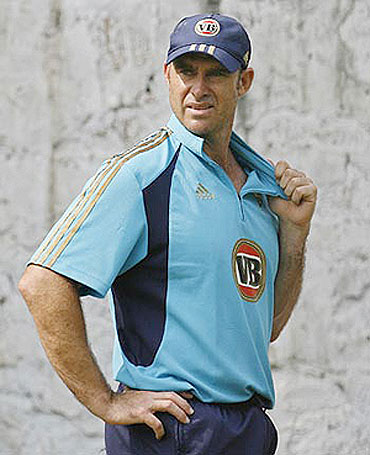 | « Back to article | Print this article |
Hayden goes honest in 'Standing My Ground'
Former Australian opener Matthew Hayden has re-opened a seven-year-old controversy by claiming that ex-India captain Sourav Ganguly and off-spinner Harbhajan Singh chickened out of the series-deciding 2004 Nagpur Test due to a fear of the green-top pitch there.
In his autobiography Standing My Ground, Hayden writes that the Australians felt at that time that the nature of the pitch had led to the sudden withdrawal of Ganguly and Harbhajan from the Test, which the visitors eventually won to clinch a historic series win.
"The curator, a famously single-minded character with no love of the Indian hierarchy, ignored pleas to shave the deck and left a healthy covering of grass. It reminded me of Gabba (In Brisbane). To have that sort of wicket for the deciding Test of an away series -- particularly in India -- was the most pleasant surprise imaginable," Hayden wrote.
'We predicted Ganguly, Harbhajan would not play Nagpur Test'
"When Ganguly and Harbhajan went out to see the deck a couple of days before the game, they looked like farmers inspecting crops after a hail storm. We predicted neither would play, and they did not.
"Ganguly withdrew with a leg-muscle injury that flared up suddenly, and Harbhajan had an even more sudden dose of food poisoning. We put their ailments down to acute cases of 'greentrackitis', where you develop a severe intolerance to green wickets likely to give you nothing as a spin bowler and plenty of headaches as a batsman," wrote Hayden, who retired from international cricket in 2009.
'Sachin's got a fierce body language'
Hayden, who scored 8625 runs in 103 Tests, however, has plenty of admiration for Indian players and their cricketing ability and named four of them -- Harbhajan, Sachin Tendulkar, Rahul Dravid and Virender Sehwag -- among the 12 best players he had played against.
He rated Tendulkar and Brian Lara as the best among opposition batsmen.
"A significant part of his (Tendulkar's) game was his fierce body language. For a little man, he had a huge stature. And he exuded a cool nonchalance at the crease. He may have the occasional crack, but generally he let his bat do the talking. He was so fearless and (ridiculously) skillful.
"He and Lara were the most skillful batsmen I have ever seen. Just the way they manipulated the field was fascinating to watch. Against spin Sachin was in complete control. There was never any strategy implemented by Warnie or another spinner against him which made me think, 'Here we go ... let us see how he handles this'.
"Sachin is quite a shy guy, and I can't claim to know him well at all. He kept his distance. But for Sachin to survive and thrive in international cricket for two full decades is extraordinary," Hayden wrote.
'Dravid was Bjorn Borg of cricket'
For the calm and composure in times of adversity, Hayden described Dravid as the Bjorn Borg of cricket.
"They called him 'the Wall', and he was well named. Great mental toughness, watchability and the capacity to inspire ... Dravid has all these. Others might have quickened the pulse of spectators more, but with his textbook purity and great concentration Dravid was still absorbing to watch. I my era, he was the Bjorn Borg of cricket, absolute ice under pressure," Hayden wrote.
"As the chaotic forces of Indian cricket swirled around him, he was a beacon of serenity," wrote Hayden.
Hayden found Sehwag a sort of a puzzle and not quite clear in his thinking about batting, a thought contrary to many who consider him an uncluttered cricketer.
"Dravid was a beautifully organised batsman with magnificent discretion. He would drive you for four one ball, but not even think about offering a stroke to the next delivery if it was pitched three centimetres wider, and thus just outside his driving zone. But Sehwag's thinking was never as clear. Sehwag's weakness was that he could be a nervous starter and a feeler for the ball," Hayden said.
'Sehwag always a difficult man to plan for'
"But there is something magnetic about Sehwag. The core of his appeal to me is his natural aggression and his cool demeanour: he'll smoke one through the covers with imperious timing, and then look up with total nonchalance as if to say, 'What was the big deal about that. I do it for a living, you know'.
"The crowd will be going crazy, yet he shows about as much emotion as a man who's just licked a stamp and put it on a letter. A great player can suck you into bowling where they want you to, and Sehwag was always a very difficult man to plan for. On our 2004 tour of India we spent more time talking about him than any of their player -- Tendulkar included," he said.
Harbhajan had quite a few run-ins with the Australians, including the bitter Sydney Test racism row, but Hayden expressed his admiration for the feisty off-spinner.
'Harbhajan brings intensity and controversy to a contest'
"I have gone for the man who caused me the most trouble at the crease (preferring to Anil Kumble and Daniel Vettori). Harbhajan was a very attacking bowler, and traditionally an attacking spinner normally means a teasing flight bowler. He definitely was not one of those. He was more into-the-wicket spinner, using sharp revolutions he put on the ball to get bite off the wicket and cause problems.
"Harbhajan brought an intensity and controversy to the contest that put bums on seats. There was a real 'game on' feel to anything he was involved with. He could be impetuous at times -- and he could make you feel impetuous. His over-the-top celebrations -- like doing a lap of the Gabba after getting Ricky Ponting out -- were cringe-worthy."
"But I will pick Harbhajan for his superb skills. When he bowled his doosra -- the ball that spins away from right-handed batsmen -- to go with his conventional off-spinner, like Murali, he lifted his game to a level beyond the reach of conventional off-spinners. The doosra was a priceless weapon -- it made his other balls so much more dangerous as well, as batsmen asked themselves whether or not to play," Hayden said.
'Dhoni has ability to enjoy life outside cricket'
The other eight players who made in Hayden's best 12 opposition players were Graeme Smith, Brian Lara, Jacques Kallis, Kumar Sangakkara, Muttiah Muralitharan, Wasim Akram, Curtly Ambrose and Courtney Walsh.
A cricketer who enjoys life outside and has interests in surfing, fishing and cooking, Hayden said he has many things in common with his captain Mahendra Singh Dhoni in Chennai Super Kings.
"He (Dhoni) is the "most fascinating character at Chennai Super Kings. He is India's Ricky Ponting, an unpretentious working class boy with simple, clear thoughts on the game and a love of rolling up his sleeves and getting into it. Like Punter, he thrives in training. One minute he is batting, next he is throwing the stumps down, next he is onto something else. Dhoni is very direct.
"I related to Dhoni on several levels, including his ability to enjoy life outside the game and see cricket as a vehicle to pursue other passions. He is an all-action sort of character, in every way. He can be an elusive character. I have never once got him on the phone, and at times I think he likes to hide from the madhouse world in his hotel room, as well as getting out and doing his own things," Hayden wrote.
'Lara was a man of several great techniques'
Though Hayden puts Tendulkar and Lara in the same bracket, he rated the West Indian as his favourite. More so, himself being a left hander just like Lara.
"Lara was a chameleon of the crease. If you switched plans, he would switch too, always staying one step ahead of you. Plenty of batsmen have a great technique, but very few have several great techniques -- Lara did. The key to his adaptability was his beautiful hands. Soft, quick and malleable, they would take him to places he wanted to be. They were the best hands ever, I reckon, and they made him my favourite player by a street.
"Lara just captivated me. Every time he took the crease it was like a batting tutorial. Being a left-hander, I was all over his every move and I absolutely loved most of what I saw.
Lara shaped my thoughts and actions about playing spin bowling. If anyone has played spin better, I have not seen him. In fact, Lara did not so much play spin bowlers as play with them," Hayden wrote.
'Curtly was best opposition bowler I ever faced'
Among the bowlers he had faced, Hayden picked West Indian fast bowler Curtly Ambrose as the best with Pakistan left-arm seamer Wasim Akram coming a close second.
"Curtly was the best opposition bowler I ever faced -- by far. You were always under pressure with him. Did he bowl a bad over ... ever? A bad ball? A full toss? I'm sure he did, but it never seemed that way when you were facing him," Hayden said.
"The only bowler who came anywhere near Ambrose was the great Pakistani Wasim Akram, whom I faced only in One-Day cricket, and towards the end of his illustrious career. He was amazing. His swing bowling was so technically pristine that the seam was always in perfect position. Facing him was brilliant, because I knew every part of my game had to be in the groove to cope with the genius," he said.
'ICC should create two-month window for IPL'
In one of his suggestions to improve the game, he said the conflict between traditional cricket and Twenty20 must be solved. And for that, he said Indian Premier League should be given a window in the international calendar.
"My solution: embrace the new wave. Franchise cricket, as played in the IPL, has revolutionised the game. Speaking as a player, there is nothing more exciting that the opportunity to play among the best players in the world. IPL, the world's premier franchise tournament, is here to stay.
"Scheduling is the main point of conflict between the IPL and established game, particularly the clash of players' contract. This could be avoided in future by creating a two-month window in each year -- I would make it March and April -- when other forms of the game take a back seat. That is, no Tests, no World Cup cricket and so on. The IPL has the ability to generate international fan bases in the same way as the English football's Premier League.
"I believe some IPL matches should go on the road each year and be played in other countries, to make it a global competition. The sooner the world of cricket embraces the IPL, the sooner everyone can find ways to benefit from its massive potential."
